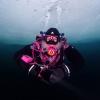
Rec diver or tech diver - to deco, or not to deco.
#1

Posted 14 May 2007 - 03:28 PM
Better minds than mine have spoken frequently on this here on SD and certainly ad infinitum on other boards, but I thought I'd let you folks in on my rationales and experiences so far.
There are a few dives that keep calling me, so I have investigated them - for example, one of the folks here wrote me a lengthy note about what a great place Bikini is.
I checked it out.
Every dive is below 130' and involves deco. They advertise that no prior training is required, but my approach to life has always been I want know what I'm doing, and not have to rely on someone else to tell me what to do for my profile.
I decided, after consulting some of the resident tech folks, to go ahead and take both the advanced nitrox and the deco procedures course - offered as one by OTWDiver. The good news:
The two courses are closely related so there is a lot of common material, and some things are reinforced that you might not "get" if you took them serially.
The better news: The very nature of the environment you are entering demands you cross into the realm of tech diving, including diving doubles (or at least redundant reg sets on an H valve) and kitting up with a deco bottle, redundant lift, reels etc. which means you get a real work out with task loading while dealing with a new setup on your back. The really great news is how humbling it is, and how it brings you back to the reality of what you don't know about diving.
Now, the not so good - you have to re-do your kit, which for most of us means digging down to buy more gear, or at least spring for rentals. The complexity of this is you have to shop around for an LDS that handles this gear, and is willing to work with you. If you're in the DFW area, let me know and we can discuss offline. I really recommend renting until you settle on the setup you want, and have completed enough training to say this is the direction you want to go down.
For those getting into purchasing your rec kit, it should give you pause for thought about what kind of diving you plan to do in the future. For me, I was able to re-use my existing regs and the BP and harness I switched to last year.
So, what was involved in the training? A full day of class, and so far, two days of diving (5+ dives). If you have had nitrox training, most of the formulas are familiar. Now, you also have to learn about deco tables and gas planning. No more jump in and return with some arbitrary psi. More details about decompression physics and DCS, most I'd had before in rescue and DM, but well worth reviewing.
The in-water skills were, as I mentioned earlier, very humbling. I don't think the skills were overwhelming, but the pace, the need to stay neutral throughout, the strange kit, and the physics of doing so much in the 20-10 foot range kept me very busy for two solid days. The work of hauling 100 pounds of tanks around both in and out of the water also made for some decisions to spend more time at the gym, and less time at the buffet.
Some skills are straight out of OW - air shares, buoyancy control, mask off swims, mask r/r. There were some new skills - valve drill being a key, timed event. The dexterity and flexibility required to reach behind your head (both hands), the discipline to open/close in the right sequence, and brain/hand coordination to NOT shut off the one your air-giving reg is connected to were the key challenges. The timing went from don't care to less than 45 seconds over 5 dives, so there was no slack. The other big challenge became creating and staying on a dive plan. This minute by minute, event by event choreography really upped the ante on task loading. Underwater communications also presented a challenge and a new set of hand signals. (mine included the classic palm slap to the forehead - indicating - "I just ****** up again")
Other skills included removing and replacing your stage bottle (stationary and on the fly), switching to your deco gas, switching back to air for air breaks (doing it as scheduled is key), SAC rate exercises, and working the lift bag - aka underwater macrame.
All in all - I recommend it - I came in thinking I wanted to gain knowledge and skills before I deliberately went into the deco world, and left understanding it is another bag of skills and knowledge that could benefit all divers. There is a financial cost that you must weigh, but you don't need to (and shouldn't) run out and buy all the kit before starting.
Jacques Yves Cousteau
#2

Posted 14 May 2007 - 03:42 PM
Mark you did good this weekend (at least that is the word on the streets) and I was proud to see our divers taking this class and their ongoing education so seriously. Team diving is even more critical in this type of diving and our teams did very well.
The task at times was daunting...most had not dove with doubles before nor with 'larger' tanks. New gear and new skills just add complexity and yet they did quite well according to their instructor.
I have also learned that in addition to hitting the gym sitting on some tel books (Dallas has lots of them) in front of a tank, you can practice the turning on and off of a tank to help build muscle memory as well as strength in the hands to not tire when doing these drills and refining these skills. Makes a nice work out program for watching tv too!
Contact me directly at Kamala@SingleDivers.com for your private or group travel needs or 864-557-6079 AND don't miss SD's 2018-2021 Trips! ....here! Most are once in a lifetime opportunities...don't miss the chance to go!!
SD LEGACY/OLD/MANUAL Forms & Documents.... here !
Click here TO PAY for Merchandise, Membership, or Travel
"Imitation is the sincerest flattery." - Gandhi
"Imitation is proof that originality is rare." - ScubaHawk
SingleDivers.com...often imitated...never duplicated!
Kamala Shadduck c/o SingleDivers.com LLC
2234 North Federal Hwy, #1010 Boca Raton, FL 33431
formerly...
710 Dive Buddy Lane; Salem, SC 29676
864-557-6079 tel/celfone/office or tollfree fax 888-480-0906
#3

Posted 14 May 2007 - 04:22 PM
#4

Posted 14 May 2007 - 09:00 PM
Every time I read a story such as this, I am more and more glad I took GUE-F (was DIR-F when I took it). As we are introduced to nearly the full skill set of Adv Nitrox/Deco without the depth. Only thing we didn't do in Fundies was handle the deco bottles. Thus I found Adv Nitrox, nearly a walk in the park by comparison.
The other thing I would like to offer, is that if you intend to actually dive below 130ft at Bikini, PLEASE take normoxic trimix first. At least that way, you'll remember what you saw. I want to dive bikini as well. But I'll have trimix in the bag before I take any trip like that.
#5

Posted 14 May 2007 - 09:26 PM
Good advice, but here's the news from their website:The other thing I would like to offer, is that if you intend to actually dive below 130ft at Bikini, PLEASE take normoxic trimix first. At least that way, you'll remember what you saw. I want to dive bikini as well. But I'll have trimix in the bag before I take any trip like that.
http://www.bikiniato...ter advice.html
At this time we do not provide helium for trimix on Bikini.
Jacques Yves Cousteau
#6

Posted 14 May 2007 - 10:00 PM
Guess I'll have to do it on CCR and take my own helium. Very disappointing.
#7

Posted 14 May 2007 - 10:11 PM
Thems the breaks.
"For the diligent diver, closed circuit rebreathers are actually safer than open circuit scuba." Tom Mount
#8

Posted 14 May 2007 - 10:16 PM
One would think that the more experience a diver has at the recreational level before beginning technical training the better. Before I became a technical instructor, I believed that most divers should reach the professional ranks of recreational diving by being divemasters or instructors before entering technical training. But, I've learned like everything else in diving and in life there are trade-off's to when one begins technical training.
The longer a diver remains in the recreational diving element, the more experience that diver will gain by becoming (hopefully) wiser, more safety conscious, and more aware of how changing environmental, physical and psychological states will affect the quality and safety of a dive. A diver will (again hopefully) master basic skills such as navigation and become more comfortable and confident with his or her abilities and less prone to panic. Eventually, the diver can grow to be a dive leader and be relied upon for guidance and even difficult rescues.
The down side to building a solid recreational career first is that entering technical training is like teaching an old dog new tricks and doctors making the worst patients. It's sometimes harder for old salts and diving instructors to eliminate bad habits that are okay in recreational diving, but are not acceptable in technical diving due to the precision required to perform everything from anti-silt finning to out of gas mid-water decompressions in no visbility and with no upline when lives depend upon it.
Conversely, newer divers who haven't had the time and experience to develop habits are more easily molded when it comes to learning the skill drills. Horizontal ascents, kicking techniques, s-drills, valve drills and the like often come easier for the advanced diver while they challenge dive pros and old salts. Pro level and highly experienced divers, however, are often better with reels, liftbags, DSMB's, holding stops and decision-making. Because newer divers can often master "the look" of the expert technical diver by mastering trim, buoyancy, and techniques, they too often fall into the trap of devaluing experienced recreational divers and dive pros and even devaluing other experienced technical divers and technical instructors. They don't know what they don't know and can be overconfident and untried. They've bled in training, but haven't endured the realities of combat so to speak and the enemy isn't always what or where you think. Rote learning and mantras can't replace knowledge formed from life experiences. Experienced divers know this and tend to be more adaptable to situations and more aware of potential danger.
If one could graph the point at which experience peaked before the ability to learn waned, that point would be "the sweet spot" at which a diver should ideally begin technical training. Too little experience and there is the danger of diving profiles in which unforseen changes in the environment or stress in a diver or one's buddies can create an accident that wouldn't happen to an experienced diver or team. Too much experience and technical training will be like relearning to dive. Technical training early on in one's diving career can certainly help form better habits upon which experience can be built and may even save lives. In so doing, the less experienced technical diver should try to refrain from the urge to push too far too fast and instead concentrate on developing experience in more forgiving depths and conditions. The experienced diver turned technical diver also needs to practice skills such as kicking techniques and good buddy and team skills before venturing into the extreme realms of the sport.
Every diver must decide for himself or herself when that "sweet spot" exists to enter technical training. Obviously, it's better to have more experience than not enough, but whether a diver is a newbie turned tech or an old salt turned tech, it's equally important to proceed slowly and develop solid skills and experience and not push too far too fast.
Right now, a gap exists between recreational skills and technical skills. Even communications between both communities are different. Most recreational hand signals emply two hands while most technical hand signals use one hand. I think the best way to currently bridge that gap is for technically trained recreational instructors to start placing greater demands on recreational student skills. Personally, I start this at the AOW level. Most students think that AOW courses are a joke because they've usually already done the diving they are then being trained to do such as night dives and "deep" dives. When you add basic technical skills such as buoyancy, trim, propulsion and team skills to night diving, deep diving, advanced navigation, search & recovery, etc., they now are truly being challenged and come away with far greater skills, yet they do not possess a technical card nor the training to believe they are ready to wall out, dive the Andrea Doria or surpassing 300 feet!
Trace
Technical Training Director
PDIC International
#9

Posted 15 May 2007 - 06:57 AM
Good thread and laudable report from Capn_Jack.A question that needs to be addressed regarding technical training is when to begin technical training?
Obviously Deco and Advanced Nitrox courses are considered "technical training" but I wonder if any of the following introduction/recreational are considered "technical" as well?
Deep Diving
Wreck Diving
Under Ice Diving
GUE-Fundamentals
Nitrox
Drysuit
Introduction to Cavern
O2 Provider
others?
When is a course considered to be beyond recreational and into the technical realm?
Capt. Nemo...........20,000 Leagues under the Sea
#10

Posted 16 May 2007 - 07:55 PM
Good thread and laudable report from Capn_Jack.A question that needs to be addressed regarding technical training is when to begin technical training?
Obviously Deco and Advanced Nitrox courses are considered "technical training" but I wonder if any of the following introduction/recreational are considered "technical" as well?
Deep Diving
Wreck Diving
Under Ice Diving
GUE-Fundamentals
Nitrox
Drysuit
Introduction to Cavern
O2 Provider
others?
When is a course considered to be beyond recreational and into the technical realm?
That's a good question, Tom, because the lines between what is recreational diving and what is technical diving have have always been blurred. The same can be said for "free" diving. If you watch any of the old Jacques-Yves Cousteau documentaries, they regulary use the terms,"free diving" and "free divers" to describe SCUBA diving and SCUBA divers. This was because divers had been tethered to a surface supplied air hose until the invention of the Cousteau-Gagnan demand regulator and the invention of the Aqualung. The world had been familiar with divers in helmets since before the 1800's, but when SCUBA diving began (as we know it) in the late 1940's, the ability to freely swim while breathing underwater was still being celebrated for its freedom even into the 1970's. Today, of course, we normally don't hear the term freediving applied to the use of any self-contained underwater breathing apparatus. Current diving vernacular assumes freediving to mean deep breath hold diving that goes beyond snorkeling. Yet, snorkeling is certainly freediving. A snorkeler submerged at 10 feet is just as much of a freediver submerged at 110 feet. Meanwhile, competitive no limits freediving will always find a diver "tethered" to a sled by being reliant upon the negative ballast for a rapid descent and an inflated liftbag for a rapid ascent. While these freedivers are redefining the limits to which the human body can go without a breathing medium, the snorkeler is far more free and untethered than a world champion variable or no limits diver in a sense. When once "free" diving meant free to swim, today it means free of SCUBA.
Regarding the terminology for technical diving, most divers look to Michael Menduno as the one who first coined the term, "technical diving" in a 1991 issue of AquaCorps magazine. Technical diving is usually defined as:
1) Diving deeper than the maximum recommended recreational limit of 130 feet. This depth limit stems from the United States Navy from the days in which they were trying to determine what applications and limitations SCUBA had compared to surface supplied air. The double hose regulators of the time, due to their construction and the positioning of the valve and stage behind a diver's head in relationship to the diver's lungs, caused the regulators to experience decreases in performance at those depths. For this reason, the Navy decided that SCUBA could be used to 130 feet and deeper dives should be made with surface supplied air and a tender team. Very deep air and mixed gas dives had been routinely done with surface supplied technology and the Navy knew that such technology would still allow divers to perform work at depths. This depth limit remained in place for sport divers even though SCUBA technology improved by the design of the single hose two stage regulator improved to negate any performance difficulties past 130 feet. Recreational agencies and government bodies around the world were happy to leave this as an arbitrary limit in hopes of preventing diving accidents. The Cayman Islands even went so far as to reduce this limit to 100 feet as an example of government control. Meanwhile, concerns about narcosis, decompression sickness and oxygen toxicity have found some training agencies and divers reducing the maximum depth limit for air or "recreational" diving to less than 100 feet. When I started diving, 190 feet was considered "recreational" by a couple of the agencies because our decompression tables went to 190 feet.
2) Dives in which there is a physical or imagined "ceiling" such as cave dives, ice dives, wreck penetration dives and decompression dives are considered to be technical dives. This is because part of the definition of technical diving has been any dive that exceeds the limits and scope of recreational diving or requires more advanced training than recreational diving is a technical dive. That does leave a lot of room for interpretation and is the very subject of your question about what activities are technical dives. Obviously, any time in which a diver cannot make a direct ascent to the surface gas management and the ability to deal with and effectively manage emergencies "on the bottom" will have to be practiced and all possibilities for danger addressed and planned. This mindset goes beyond that of what the diving industry believes divers are interested in and trained to do. Ken and Barbie models enjoying warm clear waters became the poster children for what the industry decided recreational diving was all about and drysuited divers in cold dark waters with lots of expensive danglies became the poster children for the technical realm. Strangely enough, most technical diving was being done in the warm clear waters of Florida by people like Billy Deans and Tom Mount and the "technical divers" with all the gear and danglies were just "recreational" divers doing what they've always been doing on weekends in places like New York and New jersey since the 1950's. Meanwhile cave diving was cave diving was cave diving and no one really cared what the cave divers were doing because they were crazy anyway. Well, no one except guys like Tom Mount who were cave divers and guys who thought that learning to cave dive would make them better wreck divers like Chris and Chrissy Rouse who perished on the U-869. Up until this point the cave community pretty much stuck to their thing and few asked them what they were doing to dive safely. Logically, you'd think that someone who ran a training agency other than NSS-CDS or NACD would inquire about how those divers remained alive in such an inhospitable realm, but no one really did or at least they never took this stuff into the open water realm -- until GUE. They were wise enough to market cave skills to the open water community and grew accordingly. But, DIR-F isn't technical diving by any definition. It's a skill and buoyancy course that brings the skills many divers became aware of for the first time in a cavern diving course. Well... not true if you consider that you are required to dive nitrox for DIR-F... this brings us to gases.
3) Using breathing mixtures other than air is technical diving. When I became a nitrox instructor back in the mid-90's I was a technical instructor. By the late 90's I was no longer a technical instructor. Nitrox had been considered a death gas by the recreational agencies. So much so that at one DEMA trade show they threatened to tar and feather anyone who even uttered the word. Nitrox WAS technical diving and everything was added around the fact that some divers were breathing higher oxygen mixtures and even trimix and using gases to decompress. This was heresy and the Spanish Inquisition began. Once science overuled uneducated paranoia everyone wanted nitrox and nitrox became the biggest seller in recreational training since the invention of the open water course. Now, what was the definitive technical diving gas is mainstream and not even thought of as technical diving by most people.
4) Use of specialized equipment is technical diving. Rebreathers would obviously be technical equipment as would stage and decompression bottles. Would a pony bottle be considered technical? Probably not. But, what if you carried a pony like a stage? Would thus use of a Jersey Upline be technical? They are only used in a few diving locations. who knows? Again, if it doesn't look like an ad for a honeymoon in Barbados then it would probably be technical diving. So, GUE DIR-F would be technical diving since you can use a long hose, doubles and a canister light... or, you could be one of my AOW students ftrom NY & NJ? All the recreational divers in NY & NJ had been technical divers from the start. But, that is because the industry forgot about local diving in places like Canada, northern USA, the UK and norther Europe. Every recreational diver was looking at a purple tube sponge and anyone not was too poor to go to Barbados that week.
5) Specialized training is also technical diving. But, what is specialized training? The colder the local water, the darker it is and the deeper it is for an average profile usually prompted instructors to "specialize" even open water students to deal with some arduous local conditions. An AOW class is usually far different in Hawaii and Florida than it is in New Jersey or Great Lakes states. Most AOW divers in the northeast would be exposed to technical diving at this level if not in an OW class!
Many divers dislike the term technical diving and roll their eyes when they are thought of as such. Others wear it as a badge of honor and accomplishment.
Going down your list...
Deep Diving = not technical diving if it follows the Recreational SCUBA Training Council's (IDEA, PADI, PDIC, SDI, SSI, YMCA) definition of being between 60 and 130 feet. But, definitely technical if below these depths according to the general definition.
Wreck Diving = not technical unless penetration is involved.
Under Ice Diving = yes, it's an overhead environment requiring special training to do safely.
GUE-Fundamentals = no, skill wise IMHO, but yes requiring nitrox & yes requiring "special" gear.
Nitrox = yes, by definition, but few consider it such anymore.
Drysuit = never was, but may be by definition of special training.
Introduction to Cavern = There is Cavern & Intro to Cave both of which are technical diving by definition.
O2 Provider = Medical course and performed out of the water so not a technical diving or even a diving course as such, but when given in the diving world info tends to focus on diving related emergencies.
IMHO, I think it's time we said good-bye to technical diving and just started calling it diving again. We just simply take the tools we need for the tasks we decide to do.
But, hey if you want to be a technical diver be one and if you don't just be a diver! Cousteau's team was just diving when doing all manner of technical dives such as 300+ deep dives with triples using helium and diving bells to decompress, 180 foot dives to play with Roman plunder in the Aegean followed by 30 minutes of deco. Sure, they were diving for science and entertainment, but no one gave them any c-cards for any of it and to everyone they were just diving.
Trace
Edited by TraceMalin, 16 May 2007 - 09:40 PM.
Technical Training Director
PDIC International
#11

Posted 16 May 2007 - 09:55 PM
Thank you for such a wonderful historical and interpretive post. It is so nice to have you participate once again! As you are a leader of one of the major agencies, I'd like to share a few stories for the background to my question. I am very curious of your opinions in these examples.
I too agree that these lines between recreational diving and technical diving are blurred as essentially each progression is a tool for enhancing the quality of all types of diving.IMHO, I think it's time we said good-bye to technical diving and just started calling it diving again. We just simply take the tools we need for the tasks we decide to do.
Several of the courses that I inquired about are because of a specific interpretations by agencies. In 1991 I took a Deep Diving course from Hal Watts' Professional Scuba Association at Forty Fathom Grotto in Ocala, FL. I took the Level I course which was to 100' although at that time they were offering a full series of courses which went to 240' (Level VI) and all of these courses were on air as Nitrox was considered voodoo gas at that time. I had already been through NASDS AOW in 1986 which included open water dives to 130' (at Ocean Cliff in Newport as well as on the U-853) but regardless, the PSA courses were being touted as "technical" even at Level I (100') and Level II (130'). In fact in 1991, these were the first technical courses that I had heard of although I now realize that the cave diving community had their own sets of courses and guidelines and apparently other agencies were offering Nitrox.
More recently, I took an Introduction to Cavern course in December 2006 at Ginny Springs with all 3 of my boys (ages 16, 14 and 12). The course was wonderful as outside of the new-to-me reel work, much of it was almost a GUE-Fs light. I have since observed that each of my boys are now incorporating into their diving many of these skills such as the buoyancy and propulsion techniques while doing open water dives. I consider this a positive result that is directly attributed to the course content and skill of the instructor. We were offered to receive our certifications from any of the following agencies: NSS-CDS, NACD or PADI as the content was essentially the same. Since my two younger boys are still working towards their PADI Jr Master Scuba Diver ratings, I elected for them to receive the PADI specialty certification while my older boy and I elected for the NSS-CDS because it was cheaper and we didn't need another PADI specialty certification. After months of delay in receiving the PADI certifications, PADI denied their applications because PADI requires that students be the age of 18 for this class. I called PADI to try and understand the rationale behind this and was told that they considered the Cavern course to be technical and thus insisted that their students be 18. Ironically they have set the age requirement for their Nitrox course at 15 so I guess their level of technical courses vary in further interpretation. Regardless of receiving the PADI certification (and they did end up receiving NSS-CDS certification), I am still quite pleased with the skills, and thus tools, that they learned in this course.
My point in these two examples is that it appears that each of the agencies have made specific judgement of which courses are considered technical and which are recreational. In the final analysis, I do believe that this is a disservice to all divers as it truly is the addition of new tools that is the objective in taking specialized training courses as each of these skills will to some extent extend themselves into all phases of diving.
Capt. Nemo...........20,000 Leagues under the Sea
#12

Posted 17 May 2007 - 07:43 PM
First of all, congrats on taking the course. I think it's a great course and I am glad I took it. You mention that a person would have to re-do their kit. I didn't have to redo anything when I took the course. It's just a matter of what you purchase up front.
No criticism intended, but you are a fairly new diver, Perrone Ford, and I think you had tech in mind when you started. For many of us who have been diving longer than we should be able to remember, tech diving was not even in the back of our minds when we acquired some of the gear we are using.
A new diver who thinks they may be interested in wreck, cave or other tech diving can make decisions early on about what gear they wish to acquire to realize those goals. An older diver who wants to transition into tech diving has to look at the cost of new equipment in addition to what has already been acquired in the past for their rec diving.
Of course if you are handy at robbing banks, or have invested wisely in Microsoft stock starting in the mid 80's, or have wealthy relatives soon to be deceased, this is not such a major problem. (Said with a smile).
#13

Posted 17 May 2007 - 07:47 PM
Edited by drbill, 17 May 2007 - 07:52 PM.
#14

Posted 18 May 2007 - 12:53 AM
Trace,
Thank you for such a wonderful historical and interpretive post. It is so nice to have you participate once again! As you are a leader of one of the major agencies, I'd like to share a few stories for the background to my question. I am very curious of your opinions in these examples.I too agree that these lines between recreational diving and technical diving are blurred as essentially each progression is a tool for enhancing the quality of all types of diving.IMHO, I think it's time we said good-bye to technical diving and just started calling it diving again. We just simply take the tools we need for the tasks we decide to do.
Several of the courses that I inquired about are because of a specific interpretations by agencies. In 1991 I took a Deep Diving course from Hal Watts' Professional Scuba Association at Forty Fathom Grotto in Ocala, FL. I took the Level I course which was to 100' although at that time they were offering a full series of courses which went to 240' (Level VI) and all of these courses were on air as Nitrox was considered voodoo gas at that time. I had already been through NASDS AOW in 1986 which included open water dives to 130' (at Ocean Cliff in Newport as well as on the U-853) but regardless, the PSA courses were being touted as "technical" even at Level I (100') and Level II (130'). In fact in 1991, these were the first technical courses that I had heard of although I now realize that the cave diving community had their own sets of courses and guidelines and apparently other agencies were offering Nitrox.
More recently, I took an Introduction to Cavern course in December 2006 at Ginny Springs with all 3 of my boys (ages 16, 14 and 12). The course was wonderful as outside of the new-to-me reel work, much of it was almost a GUE-Fs light. I have since observed that each of my boys are now incorporating into their diving many of these skills such as the buoyancy and propulsion techniques while doing open water dives. I consider this a positive result that is directly attributed to the course content and skill of the instructor. We were offered to receive our certifications from any of the following agencies: NSS-CDS, NACD or PADI as the content was essentially the same. Since my two younger boys are still working towards their PADI Jr Master Scuba Diver ratings, I elected for them to receive the PADI specialty certification while my older boy and I elected for the NSS-CDS because it was cheaper and we didn't need another PADI specialty certification. After months of delay in receiving the PADI certifications, PADI denied their applications because PADI requires that students be the age of 18 for this class. I called PADI to try and understand the rationale behind this and was told that they considered the Cavern course to be technical and thus insisted that their students be 18. Ironically they have set the age requirement for their Nitrox course at 15 so I guess their level of technical courses vary in further interpretation. Regardless of receiving the PADI certification (and they did end up receiving NSS-CDS certification), I am still quite pleased with the skills, and thus tools, that they learned in this course.
My point in these two examples is that it appears that each of the agencies have made specific judgement of which courses are considered technical and which are recreational. In the final analysis, I do believe that this is a disservice to all divers as it truly is the addition of new tools that is the objective in taking specialized training courses as each of these skills will to some extent extend themselves into all phases of diving.
Tom,
Your post provides some excellent examples which illustrate the confusion that divers face when trying to ascertain what courses are technical and what courses are not technical. Every agency has a different hierarchy or flow chart for skill progression and levels of difficulty have been determined by the viewpoint of each agency. PADI started as a purely recreational agency (although a cave instructor friend of mine holds a PADI Cave Diver card from the 1970's in his collection) and therefore views overhead environments as especially worrisome places to venture. The main focus of PADI's training has been to open up diving to a general public that predominantly has little or no watermanship ability possessing barely passable swimming skills and having very little mastery of watersports such as snorkeling, skin diving, surfing, etc. Before the number of specialty cards went over the top, agencies like PADI, NAUI, PDIC, SSI, NASDS, YMCA, BSAC, LA County were training divers to be open water divers and advanced open water divers and then those who showed exceptional diving, swimming and watermanship abilities were recruited into divemaster and instructor roles. Specialties were activities like ice diving and kept to a minimum. If someone wanted to go into the "killer caves" then they were sent to NACD and NSS-CDS. Because cave diving had been popular in only a few areas of the world, it really wasn't something the recreational agencies thought was necessary; unlike ice diving in which many divers in northern states, Canada and Europe were interested in doing when they started feeling cabin fever and just needed to get wet. To recreational agencies going into a cave was really part of a lunatic fringe and the divers that did so should be incredibly skilled and mature hence PADI's 18 year-old age requirement. Meanwhile, the cave agencies were accepting certified divers into their ranks from the recreational agencies and their training had broken learning to cave dive into four basic levels: Cavern, Intro to Cave, Apprentice Cave Diver, and Cave Diver. To the people who were developing the training programs for the cave agencies, a cavern dive is pretty easy stuff compared to diving with stages and descending into places like Wakulla on deep air. They had kids, students with kids, and friends with kids and as they explored the rivers and springs with them the cave gurus learned that kids could dive maturely and were accepted at age 15 into cavern classes. I'm actually surprised that they are providing certification for younger divers. Introduction to Cavern must be a new course. I was only aware of Cavern & Introduction to Cave courses. Nitrox, which first scared the crap out of the recreational agencies because it must be being pushed by the drug culture along with LSD and heroine, turned out to be a really simple gas to dive. Nothing really changed in how one dove it other than the tables used and the fact that a diver had to be aware of an MOD. Any open water diver could dive it and if they couldn't they really shouldn't have an open water card in the first place. Since 15 was the age for open water certification, they concluded, why not allow 15 year-olds to dive nitrox? Once kids started diving it, it pretty much lost its spot on the technical totem pole. Conversely, cavern certifications had been recreational specialties like ice diving and they really weren't considered a technical level other than a point of entry that was still recreational until the definition of technical diving elevated them in prestige. Points of entry brings us to the technical agencies. Before technical agencies branched into open water training and recreational agencies went technical, all tech agencies were built on the foundation of nitrox... or deep air in PSA's case. So, any entry level course into a technical agency was a technical level course whether PSA's Level I (100 ft) or GUE's DIR-F. These courses were needed to tweak the skills of divers and make sure they were ready to go deep or begin using gases and find themselves in a decompression or cave overhead.
Now, I believe we've reached a point of saturation when it comes to C-cards. The daunting array of certifications is a definite "turn off" to the diving public. While the diving industry struggles to survive like a pack of wolves fighting over the carcasses of all prospective students, it is begining to starve on the ramifications of the gluttony it created beginning in the 1990's. For example, today, a gentleman in my gym asked me about scuba training. He's athletic, works out and swims regularly, and probably would be able to easily learn the skills and enjoy the sport. I suggested he call me and make an appointment to come to the heated indoor pool at PDIC HQ and do a discover scuba type course for a day. Up to this point I had him. He asked about equipment and certification training. I explained the costs for each and what type of gear and what an open water course would entail. His interest was growing because he thought there would be more to it than that. I explained that beyond OW an AOW course would teach him to do night dives, deep dives, search and recovery and learn to swim patterns and not just outbound and reciprocal courses like he'll learn in OW. He was still interested. He asked if he needed any training beyond that, I then began to explain specialty courses, and he was immediately put off. He said, "Oh, no, no, that's too much. I think I'll just do the basics if that's okay. But, I can still go diving and do most things right?" I think it becomes too much for most people when they see the endless array of c-cards. I know that it became annoying to me and if I was given college credits for all my certs now, I'd have a M.S. or PH.D. in Diving Concepts!
I think we need to simplify the training structure back to complete courses and reduce porkbarrel specialties and drop the idea of technical diving.
Trace
Technical Training Director
PDIC International
#15

Posted 18 May 2007 - 12:55 AM
Darn, Trace... I guess I missed my "sweet spot" and I didn't even know it. Good to see you, my friend.
That's what happens when you get a Harvard education!
Thanks, Bill! You too!
Trace
Technical Training Director
PDIC International
1 user(s) are reading this topic
0 members, 1 guests, 0 anonymous users


















